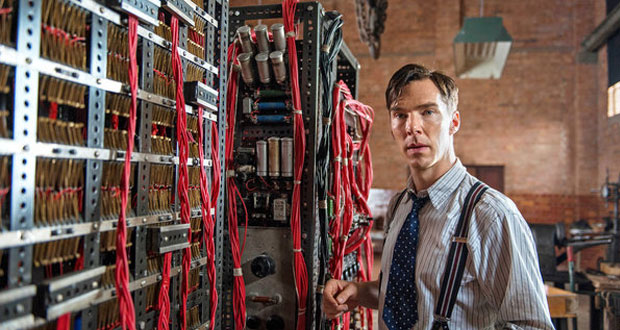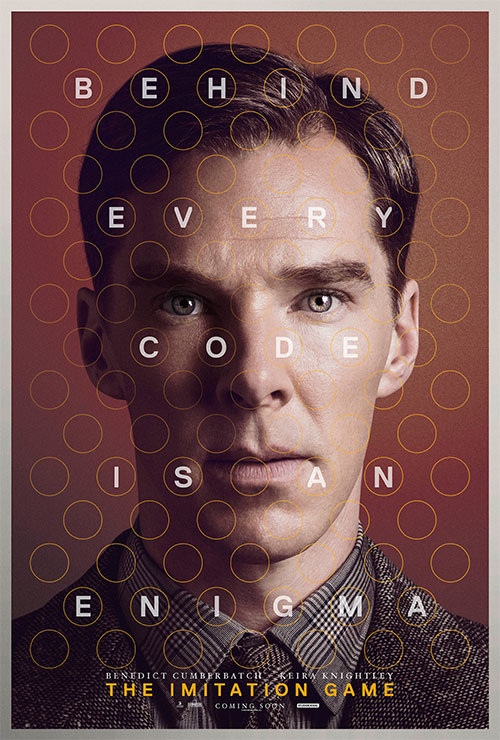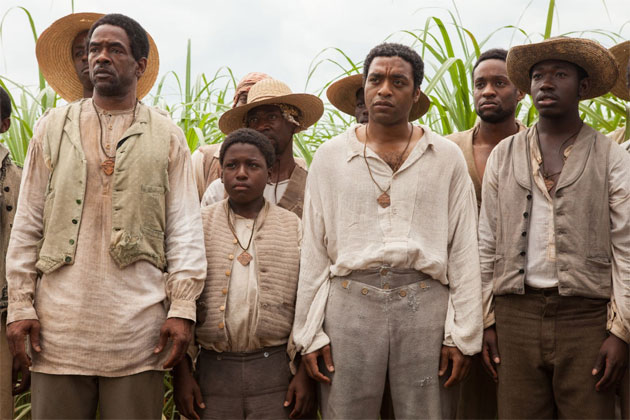Director: Morten Tyldum
Writer: Graham Moore, Andrew Hodges
Cast: Benedict Cumberbatch, Kiera Knightley, Charles Dance, Mark Strong
As you read this review of The Imitation Game, be it on a computer, tablet or smart phone, you have at your fingertips a device that owes its heritage and design to papers written by Alan Turing in the 1930s.
Turing is a remarkable figure of the 20th Century who is credited with helping decipher the Engima Code which helped the Allies win World War II. He is also one of the pioneers of computer science and a gifted mathematician.
Despite these accolades, it has only been in the past five years that Turing has begun to receive the level of recognition that he deserves. A decade after cracking the Enigma Code, Turing was dead, having been the victim of appalling treatment by the British Government who chemically castrated him for the ‘crime’ of being homosexual. In 2009, an Internet campaign lead to Prime Minister Gordon Brown apologizing to Turing on behalf of the British Government and then in 2003 Turing was officially pardoned by the Queen.
The Imitation Game is a slickly constructed, crowd pleasing bio pic by Morten Tyldum which looks at the life of Alan Turing during three key stages of his life – his school days, the war effort to the crack the code at Bletchley Park and lastly, his arrest and persecution in the Fifties.
From Turing’s days as a school boy right through to his initiation into the war effort, he is shown to be socially awkward, falling somewhere on the autism spectrum. He is gifted at cryptography but has immense trouble relating to his peers who find him obstinate and arrogant.
The supremely talented Benedict Cumberbatch plays the part of Alan Turing and he is the perfect man for the job. Cumberbatch already made his name performing in the role of Sherlock, another aloof and arrogant genius. Cumberbatch has a unique quality about him where he can present himself as being emotionally distant and detached, but he retains an air of vulnerability and sensitivity that draws the audience to him. What better choice could there be for the part of Alan Turing?
Screenwriter Graham Moore takes on the difficult challenge of condensing Turing’s life into a two hour film and I think his decision to split the film into three time periods works a treat. The film begins and ends with Turing in the Fifties as he talks with a investigating police officer. The film opens with a mystery – Turing’s home is broken into but nothing is stolen. Eventually the police work leads to Turing’s arrest and his interview with Detective Nock (Rory Kinnear) which unfurls the details of his life.
Tonally, the film performs a careful balancing act. During his formative years at school, Turing is relentlessly bullied but we see the making of him when he has a chaste high school romance with Christophe, a fellow student, who introduces him to cryptology. Turing develops feelings for Christophe but before he can share them, Christophe dies of tuberculosis. Like the last years of his life, the high school chapter of Turing’s life is a time of great sadness and melancholy.
Perhaps to avoid a relentlessly dour and brow beating film for the full two hour running time, Moore’s screenplay covers the war effort at Bletchley with a much greater sense of levity and humour. I thought Turing’s code cracking crew that he assembles reminded me of a Joss Whedon inspired ‘Scooby gang’ and the manner in which Turing outwits his rival and begrudgingly gains the respect of the stony faced Commander Denniston (Charles Dance) felt like a comic mash up of a Tom Clancy spy thriller and Silicon Valley. Livening up the proceedings in the Bletchley section of the film is Kiera Knightley who plays Joan Clarke, the only woman in the code cracking team and the person who Turing ultimately ends up confiding in the most.
The Imitation Game has the framework of a solid film that is elevated to greatness thanks to the performance of Benedict Cumberbatch. The role of Alan Turing in this film is a fantastic opportunity to show the British thespian’s range as he gets to play the mad scientist, the leader, the confidant and the broken hearted.
If there’s one blemish that I think the film has, its that it feels a little too polished and clinical at times. The story of Alan Turing’s life is a remarkable one and deserves a wide audience but some of Morten Tyldum’s directing steers this film into ‘Oscar bait’ territory with its air of self congratulatory back patting and mawkishness. The film rightfully glares a shameful spotlight on the British government that persecuted Turing for his sexuality but then it also neuters its own portrayal of Turing’s sexuality, keeping it firmly closeted and off screen. The film also tries to shoehorn in some convoluted Hallmark Card platitudes – “Sometimes it is the people who no one imagines anything of who do the things that no one can imagine” – and goes on to repeat this line not once but three times. I think the film makers should trust that Turing’s accomplishments as an outsider in society speak for themselves and don’t require a pre-packaged one liner to sell it to the audience.
It’s pretty incredible to think that in 2002, Hollywood produced a film called Enigma about the breaking of the Enigma code and the film whitewashed the inclusion of Alan Turing entirely. The Imitation Game is a film that restores Turing’s contribution and is a terrific morality tale about the meek inheriting the Earth. I loved this assessment from AO Scott of the New York Times in his review of The Imitation Game.
“The Imitation Game” is a parable of disruption. It not only provides an origin myth for the digital age, but it also projects the ideology of the present back into the past. Turing, an eccentric visionary stuck in an organization that is bureaucratic, hierarchical and wedded to tradition, is an apostle of innovation. Commander Denniston lectures him about the importance of “order, discipline and chain of command” for the war effort, but the solving of Enigma decisively rebuts this old-fashioned notion. The strategic acumen of generals and the tactical valor of soldiers is incidental. What won the war was data, and the heroes were the tech guys (and the one woman) who worked late, snacked freely, fiddled with crossword puzzles and geeked out over a piece of hardware that looked like a giant toy. Hut 8 at Bletchley Park serves as a prototype for the corporate campuses of Apple, Google and Facebook.
– A.O Scott, New York Times
I couldn’t put it any better.
Review Overview
Rating
Great
Summary : A highly polished and crowd pleasing bio pic about the life of Alan Turing. Benedict Cumberbatch's performance is a highlight.
 The FAT Website est. 1999
The FAT Website est. 1999






